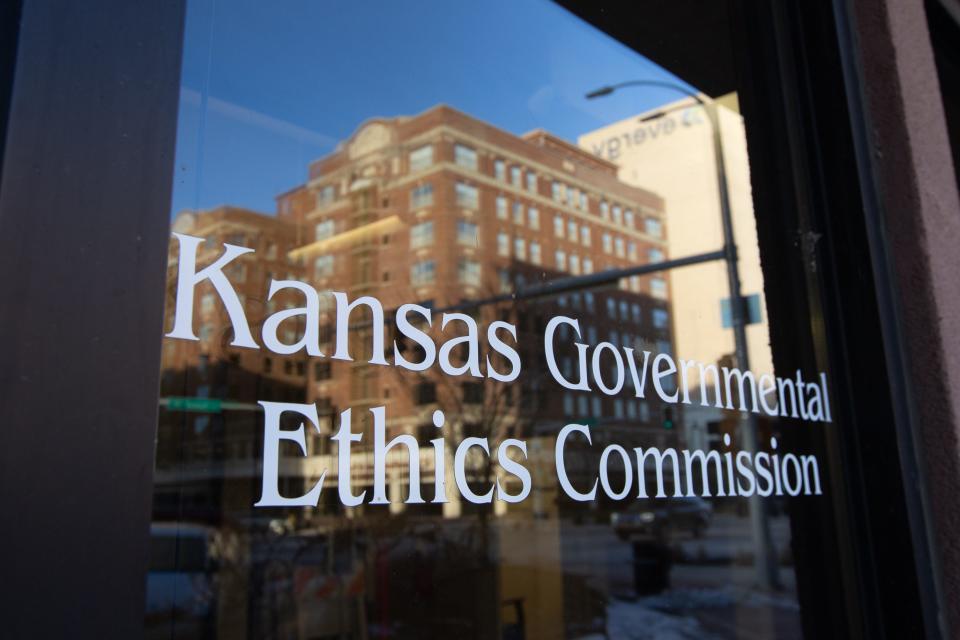Kansas ethics regulators can waive fines — but some think they aren't consistent
When Timothy Tarkelly joined the Neosho County Democratic Party, he said he quickly found the group to be "in shambles."
While Tarkelly was appointed treasurer, triggering a mandate that he handle the filing of the group's campaign finance reports, he stepped down days later from his role after he said party leadership wouldn't even grant him access to their financial records.
Nonetheless, a failure to file a campaign finance report put him on the radar of the Kansas Governmental Ethics Commission. While Tarkelly said he notified party leadership of the letters he got from the agency warning him that he hadn't filed the requisite reports, he said he disregarded the notices because he didn't believe he did anything wrong.
Because of this, Tarkelly asked the KGEC to waive his fine — something that isn't uncommon.
Often, if a person incurs a low-level violation of the state's campaign finance or lobbying laws — such as filing the required reports late or not at all — they will do what Tarkelly did and ask the Ethics Commission to waive or lower the fine associated with that offense.

While some factors, such as an illness or an inability to pay the fine, almost always result in a waived or reduced fee, other times relatively similar cases see disparate outcomes. There is no formal regulation governing when the Ethics Commission should waive a fine — Tarkelly, for instance, did not receive one.
Now, the agency is taking a look at its policies to ensure it remains fair. It comes after a meeting earlier this year where members of the commission said they wanted to search for a more standardized process in determining who should get a fee waiver and who should not after the body opted to reduce the penalties for some individuals — but not others.
"It feels like a personal preference or beauty pageant sort of approach as to whether something is waived or something is not," said Christopher Burger, a commission member appointed by House Speaker Dan Hawkins. "Which provides no guidance to staff, no guidance to the people we serve. ... It needs to either be a big deal or not."
Ethics Commission looks to streamline fine appeals for Kansans
Commission members have said the current system stems from a desire to educate individuals about the state's laws, rather than immediately looking to levy the maximum punishment.
Campaigns and political action committees must file regular reports about their spending and fundraising activities, as do local and state political parties. Registered lobbyists, meanwhile, must also disclose their activities to the Ethics Commission.
If an individual fails to file those reports or does not do so in a timely manner, they can face fines of up to $1,000 for candidates or their treasurers, or $300 for lobbyists.
Between 2019 and 2022, KGEC data shows that 156 individuals requested a waiver from civil penalties for failing to file required reports. Of those, 83 — a little over half — were granted a full waiver and an additional 42 received a partial reduction in the fine amount. Only 20% were rejected outright.
Unlike other states, Kansas does not require a particular form be submitted to outline why an individual is seeking a waiver, though the reasons will generally be articulated via email or letter. Documentation of illness, natural disaster or other reasons also is not required.
This has led, executive director Mark Skoglund acknowledged, to a model that is more lenient than seen elsewhere. The Federal Elections Commission, for instance, has very few circumstances in which they will waive a penalty for failing to file a required report or filing a report late.
Members expressed an interest in outlining a clear list of factors that would be considered for a waiver — and those that would not.
"When it comes to the penalty phase, mitigating circumstances are something we need to take into consideration," said Mark Schoenhofer, a commission member appointed by Senate President Ty Masterson. "But make it easy to understand, make it clear up front so it isn’t the same excuse of, ‘Geez, I didn’t know.’"
More: Gov. Laura Kelly signs compromise bill to change Ethics Commission subpoenas, procedures
Others wanted to ensure that the commission didn't become too stringent in how it meted out the law.
"My concern is we would become too rigid and maybe not as understanding of some particular circumstances," said Patricia Dengler, a commission member appointed by Gov. Laura Kelly. "I think there needs to be a catch-all category because none of us certainly would have anticipated the problems that would have come under the COVID circumstances."
Determining who gets a waiver isn't always a straightforward decision.
Also on the agenda was the case of Eugene Bradley, who registered as a lobbyist for the Enlisted Association of the National Guard of Kansas, a volunteer position that he said he was not compensated for. The group did not expend any money lobbying, Bradley said, and he sought a waiver for $1,000 in fines he incurred for not filing a report earlier this year.
But Skoglund also noted Bradley inquired about the matter shortly after the deadline, something that indicated he was aware of the requirement, but ultimately didn't file until 13 days later.
The commission ultimately dropped the fine to $250 after 15 minutes of debate and a quip from Burger.
"I’d hate for him to be 16 degrees off on his artillery fire," he said.
This article originally appeared on Topeka Capital-Journal: Kansas Governmental Ethics Commission may revamp fine waiver process

